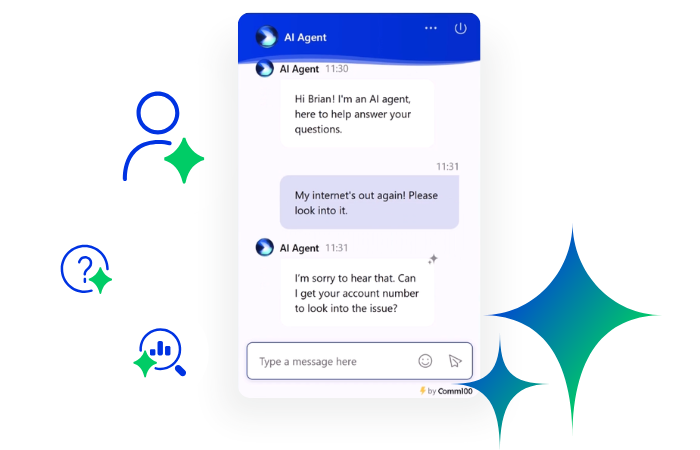Note: This blog post was co-authored by Dani Apgar, EVP & Co-Founder of RapportBoost.AI and Kaye Chapman, Content & Client Training Manager at Comm100.
Live chat communications continue to trend upwards in importance. No surprise here. eMarketer predicts that in just one year from now, 80 percent of the world’s smartphone users will use messaging apps. We’re more connected than ever, and that provides challenges for modern sales and service organizations. Today’s online customers want and expect a fast response time to their customer service query, plus a frictionless way to initiate support.
Forrester reports that 55 percent of adults will abandon online purchases if they can’t find a quick answer to a question, with 77 percent stating that good online customer service is the most important thing a company can do for them. It’s clear that in today’s climate of consumer choice, organizations who provide support at point of sale through live chat stand to gain the most in customer loyalty and reduced cart abandonments.
Connecting with website visitors through live chat also takes less time and human resources than phone support to consumers, raising productivity and profitability. As chat agents are expected by their organizations to be valued support partners for customers and prospects, these individuals play a larger role than ever in securing overall customer satisfaction and brand equity.
For new agents, a structured onboarding program is crucial to allow organizations to ensure that they’re getting the satisfaction outcomes they seek. Not only does effective onboarding introduce employees to processes and procedures within their new role, it also builds confidence, trust and engagement at possibly the most crucial stage of their lifecycle in the organization – a stage that largely sets the tone for the rest of their employment and their interactions with customers.
Here are some tips for managers and leaders looking to build an effective live chat agent onboarding process, or refine their existing one.
1. Train to the chat platform
Chat systems tout their ease of use and turnkey nature. However, any technology tool requires time for operators to get familiar. Optimal use of tech by live chat agents is fluid and tacit, and even with the simplest of tools, it still takes time for agents to get to this level of mastery.
Make training hands-on, incorporate real-life exercises, and use training-ready versions of the platform to allow agents to roleplay and test common scenarios. Give agents time to play around on the platform and engage in practice runs before bringing them live. The last thing your agents need while tangling with customer issues is also battling the tech they use, so don’t assume they’ll just “pick it up”.
2. Establish clearly defined goals and relevant metrics
If your agents aren’t clear on what they’re supposed to achieve, they won’t be able to secure the outcomes you need. While this might sound common-sense, failing to clearly communicate expectations is a symptom of the “curse of knowledge” – where we can assume that agents know the ropes when that’s simply not the case.
The concept of “going above and beyond” is one area that’s often neglected in agent onboarding, as many see it as a basic tenet of customer service, or something that should be implicit in an agent’s personality. But it’s a hugely important area which should be explicitly covered in onboarding to be sure that your agents really are on the same page as you. For service organizations, not practicing this philosophy can spell CSat disaster– and for sales organizations, this equals leaving money on the table.
Don’t leave this to chance. Promote this concept and empower your new live chat agent to do more than just answer a visitor’s stated questions. Challenge them to always consider what other help they could provide, or what else could be useful if they were in the customer’s position.
In terms of lead generation, this “one step further” approach is especially vital. Teach agents early on how best to seek out potential lead opportunities. That means more than just pointing the customer to a white paper. They should also offer to pass them to an inside sales person for more in-depth discussions, or to a video that requires registration, for example. Giving customer service agents the authority to foster meaningful dialogue rather than focusing on how quickly chats are completed can support lead generation objectives as well.
3. Integrate them with the entire chat team
Research into learning has shown that development of knowledge in onboarding is inseparably bound to learner activity in a number of different contexts – the physical (work space), the material (tools and tech) and the social (other employees).
Because of this, social aspects of learning and working should be accounted for within effective onboarding programs. Your goal should be to help your new agent learn from other seasoned agents, and empower them to build relationships within the whole team.
Before going solo, new agents should serve time as an understudy to one of the team’s top performers to glean proven tips and tactics to successfully perform the job. Document best practices to disseminate valuable “lessons from the front line” to all agents. Establishing weekly meetings to discuss events that went well, those that didn’t and trends in the field that can turn into great teaching moments for the entire live chat team.
As a bonus, creating this kind of supportive team environment will improve the productivity and success of all agents, not just those who recently joined the company.
4. Educate agents on when to get help
A live chat agent can solve a majority of the customer service issues that come in, but they can’t act as a mouthpiece for every function within your company. Most likely, they can deal effectively with 80 percent to 90 percent of customer queries, with the extra 10 to 20 percent needing further checking, information or consultation with other teams.
That’s not a bad thing. If you try to force agents to deal with things that require too much improvisation or that the agent does not have authority to do, you will trigger negative customer interactions.
Set procedures for agents to quickly get assistance from a supporting team or team leader when issues are beyond the scope of their power or authority to resolve. Recognize that on paper, this sounds simple, but in practice this can be a lot tougher – even the most seasoned agents encounter situations they haven’t seen before, and deciding where the boundaries are isn’t always easy to define.
Focus on building supports to help your agents in their decision making, for example through a robust agent-facing KB, or through having team leaders and floor walkers readily available. Build a culture of communication which encourages agents to speak up when they’re not sure about something and discourages them from “winging it”.
Finally, make sure that whatever supports you use, they’re easy and quick for agents to access. Few things are more frustrating for a customer than spending 15 minutes on a live chat waiting for an answer because the agent doesn’t have the assistance they need at hand.
5. Utilize Technology To Support Agents
Technology is developing rapidly, and for many contact centers, shifting to new tech-focused service models comes with questions and risks. There’s sometimes a view that technology will end up reducing service quality, and some are even concerned that chatbots and AI will end up taking jobs away from humans.
This narrative is shifting as firms begin to recognize the best applications for this technology – and often, that means aiming to complement and enhance the work of human agents, not to replace them.
When used properly chatbots can provide great advantages to a new agent. The ability for bots to take on common customer queries cuts out questions which can be perceived as boring or repetitive, leaving your agents to focus only on the queries that need their help the most. This allows you to effectively upskill your agent pool as your agents develop expertise in longer and more complex queries. Agents enjoy connecting with customers, not answering repetitive questions.
Augmented intelligence is another exciting area through which agents can be provided with data which helps them to make better decisions. Through deep learning, natural language processing and multivariate analysis, companies are able to analyze more variables and more extensive data sets than is humanly possible to help agents perform better at their jobs. The goal of these systems should focus on arming humans with information they can use to engage the customer more effectively.
At RapportBoost and Comm100, we’ve frequently seen that the very best chat agents aren’t the ones who are naturally gifted at charming the customer. They’re the ones who possess superior emotional intelligence, situational awareness, defer to the algorithm in certain circumstances, plus use their instincts and experience to decide when different situations require different tactics.
The combination of human AND machine once again beats either one alone – and this is certainly an exciting prospect for anyone looking to help agents to do the best job that they can, through onboarding and beyond.
Powerful live chat software
Offer real-time, personalized, efficient support that your customers and agents will love at 1/3 the cost of voice support.
Learn more
Comm100 Live Chat







